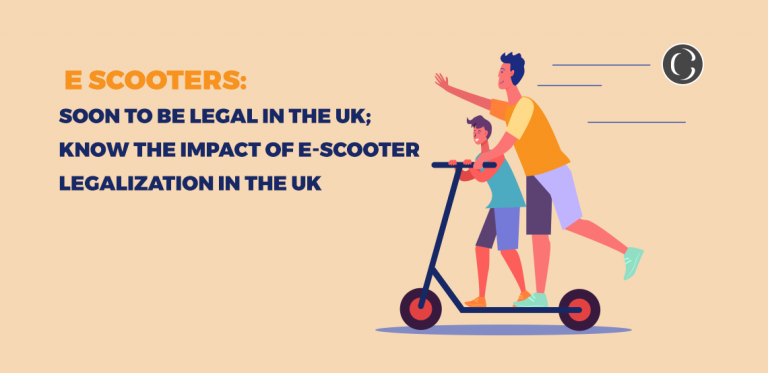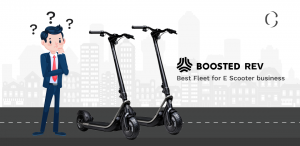E-scooters are finally legal in the UK – Tips to start your e-scooter sharing/rental business in the UK

Nowadays e scooters are becoming more popular in the world. With the growing popularity of e-scooters, many startups have emerged to offer e-scooter sharing services to commuters, and now there are more than 100 such service providers across the globe. It is expected that the global shared e-scooter market will reach up to $50 billion by 2025.
However, there are many countries in the world that still have not made it legal to ride an e-scooter on public pavements, and the UK is one such country. It is currently illegal to ride an e-scooter on public roads, cycle lanes, or pavements in the UK. But the COVID-19 made the UK change its view on e-scooter and now the UK government is seeking fast-track trials to ensure people’s safety and ease the burden on public transport.
Before this proposal to legalize the use of e-scooters was initiated, riding an e-scooter on an open road used to cost rider a fine of £300 without any further consideration, 6 points on his/her driving license along with a penalty notice.
But now that the UK is planning to legalize e-scooters, the Transport Government will be testing the proposal in four major areas of the UK, Derby & Nottingham, Portsmouth & Southampton, the West of England, and the West Midlands to see if it works out well or not. Along with the e-scooters, drones will also be pilot tested in these areas for the delivery of medical supplies.
The entire pilot test project is going to cost the government around £90M and will closely be supervised by the experts on the respective fields such as airports, government councils, medical, and universities. If the instant pilot test goes well, the UK government will legalize the use of e-scooters all over the country.
The reason behind this drastic proposal of transformation in the use of e-scooters is not only the COVID-19 response measure but more economical, environmental, and the country’s Going Green initiative.
So let’s go deeper to see what the UK government is planning in its proposal and how it will impact the last-mile operators.
What are the proposals for the e-scooter trials:
To facilitate the trials the selected local e-scooter rental companies will be designated to provide shared-e scooters in a safer and controlled manner across the streets in the UK. Starting with the four stated areas, the UK government will gradually expand this pilot to the surrounding areas to ascertain the likely demand, usage, or issues in a more productive way.
But the UK government has strictly prohibited the use of privately owned even in designated trial areas as of now and will consider making it legal after analyzing the situation after some time of the pilot.
What are the proposed regulatory changes:
During the period of ongoing trials, e-scooters will be classified as motor vehicles, and as result insurance and a driving license will be required to use them. The purpose of it is to regulate e-scooter trials in a similar way to electrically-assisted pedal cycles (EAPCs) aka e-bikes to ensure public safety at the same time not stifling innovation or demand.
Similar to provisions in the USA, where some cities require app-enabled e-scooter sharing service providers permit to operate, and have separate traffic norms for them, the UK will also enable such provision across the whole country.
What are the proposed fleet regulations:
As stated above though e-scooters will be defined as a motor vehicle but should be designed to carry one person standing up, with only one electric motor, a maximum weight of 35kg.
The speed limit is set to be 12.5 mph where for EAPCs the speed limit is 15.5 mph but the government will keep a close eye to this and will extend the limit if found appropriate. The major concern the government has for not allowing higher limits from the beginning is some e-scooters can reach speeds of 30mph and most importantly it is possible to modify their engines and increase the speed so users may not abide by the limit and potentially put many lives at risk.
What are the proposed regulations for riders:
As stated, in the trial period, riders need to keep the provisional license and motor vehicle insurance with them. E-scooter need not be insured, once they legalize, although, it more depends on the outcome of the trials. But maybe the rider will need to have 3rd-party insurance to cover any damages caused to others.
Also, to allow the maximum possible number of people to participate in this pilot project, the formal training and testing of riders have not been made compulsory. Helmets are also recommended and not mandatory.
Well, these steps could lead towards a more casual approach to the use of e-scooters and can also transmit further when e-scooters get legalized and raise intense safety concerns.
What are the proposed rules for pavement usage:
With ongoing trials, e-scooters will be allowed to travel on the cycle lanes and roads but not on pavements. Even if they are going to be legal in public, they will only be made legal on roads and cycle paths and not on pavements unless some strong reason leaves no option to the government.
Underlying uncertainty in the proposed plan:
There are certain ambiguous points which are yet to confirm by authorities in this proposed pilot project of e-scooter which are listed below:
- The Transport Committee of the UK has launched an inquiry to explore its proposed plan in terms of the safety of commuters and the legal implications of e-scooters, also, their impact on congestion, and the environment.
- Also, if the e-scooters are considered under the motor vehicle laws, then all the provisions including road tax, and technical safety standards will be applied or not?
- And most importantly, the same provision of e-scooters will apply to other micro-mobility vehicles in the future?
How e-scooter legalization impact existing transportation in the UK:
The UK is the last major European country where e-scooters are still banned on public roads even on private land they are allowed only with the landowner’s permission. But now with the latest developments in the UK, it looks like the country is going under some major transport revolution.
Also, being an industrial revolutionary, the country is lagging behind in technological revolution as with this project, the UK government has embarked on some biggest review of its transport legislations in the centuries.
But this transport revolution will bring some major implications with it for commuters as well as operators in the UK. Let’s try to find out together:
- The first and foremost challenge is that the UK is lacking the dedicated infrastructure for e-scooters which raises the important question of how e-scooter users can safely share the space with other traffic be it pedestrians, specially-abled people, or normal road traffic.
- The UK government may set specifying minimum standards for safety features for e-scooter fleets such as bells, brakes, headlights, or reflectors.
- In the UK, currently, the training course for upcycling named Bikeability exists. So in the future, a similar course for e-scooter riders may emerge either in the form of in-app resources, an online tutorial, or practical classes.
- The highway code may also get changed with the new forms of road-sharing.
- The parking of e-scooters on the streets of the UK is going to be a major issue. As e-scooters need to be left somewhere between journeys, or at the time of pick up or drop off in a way that they don’t deter people from using public space and that is quite difficult with the lack of infrastructure in the UK.
- Also, some charity groups in the UK have raised concerns that e-scooters may replace daily workouts in the form of walking or cycling and negatively impact the health of people.
- But there is an immense opportunity to set up an e-scooter sharing service as a last-mile transport in the UK. As existing transport routes are established in a way that brings uncomfortable journey experience to people as there is not a link between a station and a place of work or residence.
- There is also some exciting news for other micro-mobility operators as the UK government is currently consulting on allowing MaaS to operate all over the country. Well, all this majorly depends on the ongoing e-scooter trials.
Looking for the right tech partner to set up an e-scooter startup in the UK?
If you are a startup wanting to enter the shared e-scooter market of the UK and this is a golden opportunity for you to gear ups and the most important thing that you need to survive the competition is a unique and well-featured app to attract and sustain users.and for that partnering with right technical company is a must.
Coruscate is a leading name in the on-demand app development industry in general and the e-scooter app development industry in particular. We have hands-on experience in building e-scooter sharing apps in the markets of all over the world.
Our white label solution – Rohak can make your scooter sharing idea an instant big hit. Contact us now to know more about Rohak and discuss your idea.
Stay tuned for our next blog on the future of micro-mobility in the UK…









